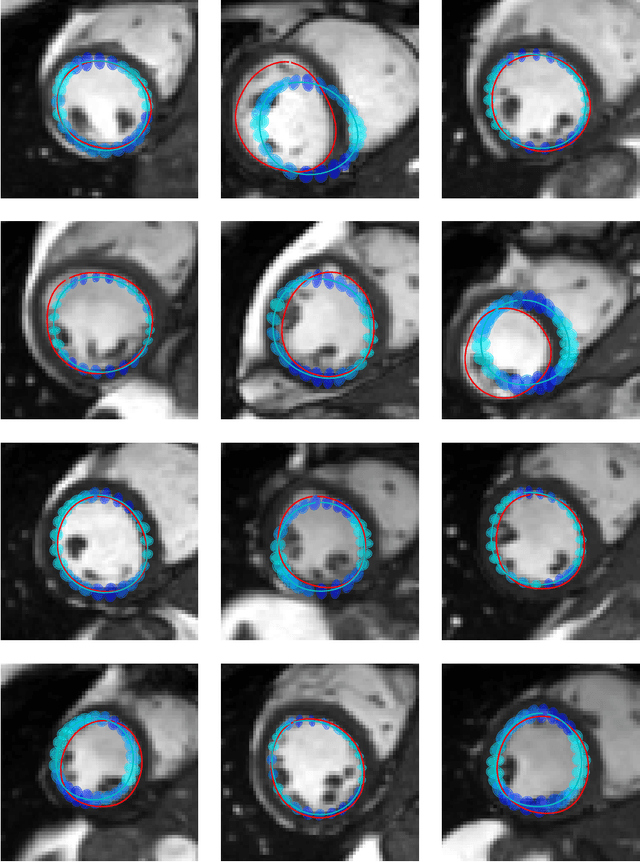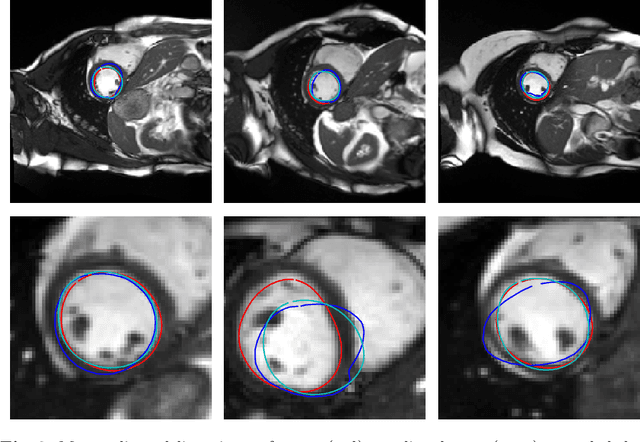Katarína Tóthová
Quantification of Predictive Uncertainty via Inference-Time Sampling
Aug 03, 2023Abstract:Predictive variability due to data ambiguities has typically been addressed via construction of dedicated models with built-in probabilistic capabilities that are trained to predict uncertainty estimates as variables of interest. These approaches require distinct architectural components and training mechanisms, may include restrictive assumptions and exhibit overconfidence, i.e., high confidence in imprecise predictions. In this work, we propose a post-hoc sampling strategy for estimating predictive uncertainty accounting for data ambiguity. The method can generate different plausible outputs for a given input and does not assume parametric forms of predictive distributions. It is architecture agnostic and can be applied to any feed-forward deterministic network without changes to the architecture or training procedure. Experiments on regression tasks on imaging and non-imaging input data show the method's ability to generate diverse and multi-modal predictive distributions, and a desirable correlation of the estimated uncertainty with the prediction error.
Probabilistic 3D surface reconstruction from sparse MRI information
Oct 05, 2020



Abstract:Surface reconstruction from magnetic resonance (MR) imaging data is indispensable in medical image analysis and clinical research. A reliable and effective reconstruction tool should: be fast in prediction of accurate well localised and high resolution models, evaluate prediction uncertainty, work with as little input data as possible. Current deep learning state of the art (SOTA) 3D reconstruction methods, however, often only produce shapes of limited variability positioned in a canonical position or lack uncertainty evaluation. In this paper, we present a novel probabilistic deep learning approach for concurrent 3D surface reconstruction from sparse 2D MR image data and aleatoric uncertainty prediction. Our method is capable of reconstructing large surface meshes from three quasi-orthogonal MR imaging slices from limited training sets whilst modelling the location of each mesh vertex through a Gaussian distribution. Prior shape information is encoded using a built-in linear principal component analysis (PCA) model. Extensive experiments on cardiac MR data show that our probabilistic approach successfully assesses prediction uncertainty while at the same time qualitatively and quantitatively outperforms SOTA methods in shape prediction. Compared to SOTA, we are capable of properly localising and orientating the prediction via the use of a spatially aware neural network.
Uncertainty Quantification in CNN-Based Surface Prediction Using Shape Priors
Jul 30, 2018



Abstract:Surface reconstruction is a vital tool in a wide range of areas of medical image analysis and clinical research. Despite the fact that many methods have proposed solutions to the reconstruction problem, most, due to their deterministic nature, do not directly address the issue of quantifying uncertainty associated with their predictions. We remedy this by proposing a novel probabilistic deep learning approach capable of simultaneous surface reconstruction and associated uncertainty prediction. The method incorporates prior shape information in the form of a principal component analysis (PCA) model. Experiments using the UK Biobank data show that our probabilistic approach outperforms an analogous deterministic PCA-based method in the task of 2D organ delineation and quantifies uncertainty by formulating distributions over predicted surface vertex positions.
 Add to Chrome
Add to Chrome Add to Firefox
Add to Firefox Add to Edge
Add to Edge